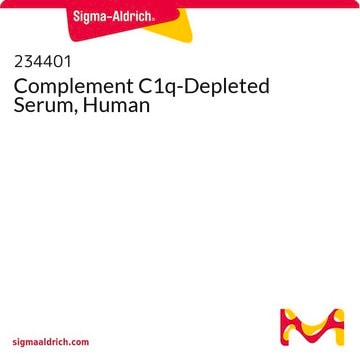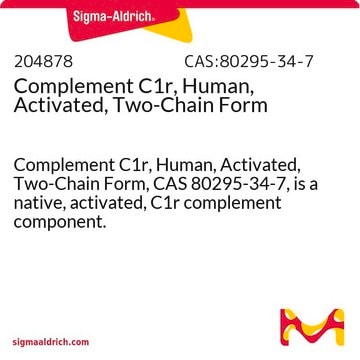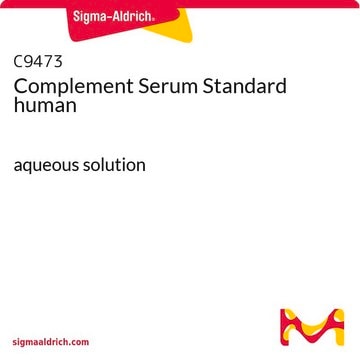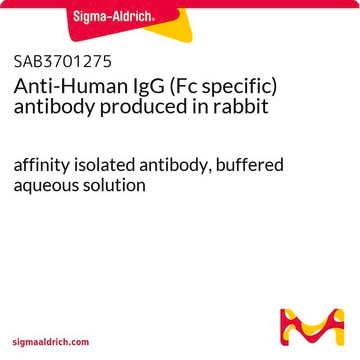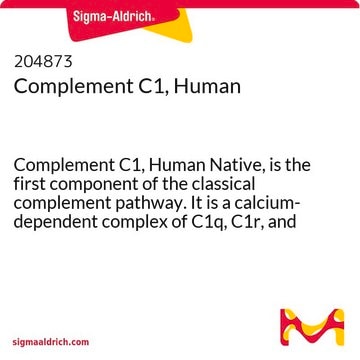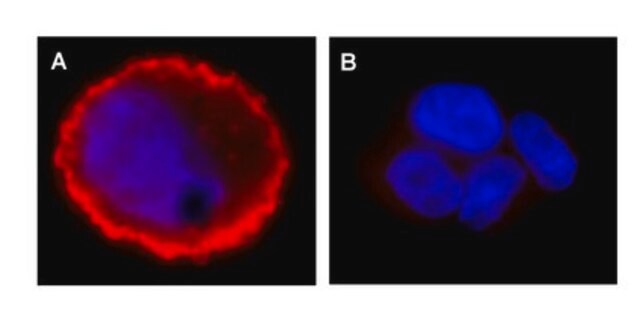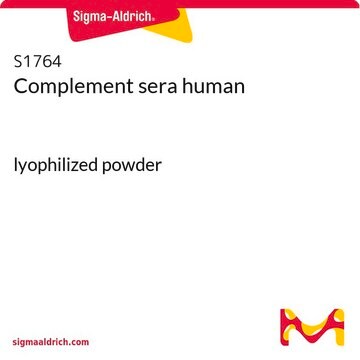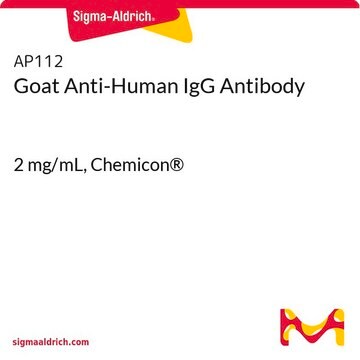204879
Complement C1s, Human, Activated, Two-Chain Form
Complement C1s, Human, Activated, Two-Chain Form, CAS 80295-35-8, is a native, activated form. Activated C1s continues activation via classical pathway by cleaving, and thus activating, C2 and C4.
Synonyme(s) :
Complement C1s, Human, Activated, Two-Chain Form
Se connecterpour consulter vos tarifs contractuels et ceux de votre entreprise/organisme
About This Item
Produits recommandés
Niveau de qualité
Essai
≥95% (SDS-PAGE)
Forme
liquid
Fabricant/nom de marque
Calbiochem®
Conditions de stockage
OK to freeze
avoid repeated freeze/thaw cycles
Conditions d'expédition
wet ice
Température de stockage
−70°C
Description générale
Native, human, activated C1s complement component. Present in human serum at 31 µg/ml. Non-activated C1s is found in circulating blood plasma as a Ca2+-dependent dimer in association with one C1q molecule and two C1r molecules to form the first component of complement (C1). Ensuing C1q binding to classical pathway activators, each C1r protein is cleaved to form activated C1r enzyme. Dimeric C1r enzyme cleaves, and thus activates, each C1s molecule into two disulfide-linked fragments of M.W. 59,000 and 28,000. The 28,000 peptide contains the C1s enzymatic active site. Activated C1s continues activation via the classical pathway by cleaving, and thus activating, C2 and C4.
Native, human, activated C1s complement component. Present in human serum at 31 µg/ml. Nonactivated C1s is found in circulating blood plasma as a Ca2+-dependent dimer in association with one C1q molecule and two C1r molecules to form the first component of complement (C1). Ensuing C1q binding to classical complement pathway activators, each C1r protein is cleaved to form activated C1r enzyme. Dimeric C1r enzyme cleaves, and thus activates, each C1s molecule into two disulfide-linked fragments of M.W. 59 kDa and 28 kDa. The 28 kDa peptide contains the C1s enzymatic active site. Activated C1s continues activation via classical pathway by cleaving, and thus activating, C2 and C4.
Conditionnement
Please refer to vial label for lot-specific concentration.
Avertissement
Toxicity: Standard Handling (A)
Forme physique
In 130 mM NaCl, 50 mM sodium phosphate, pH 7.2.
Notes préparatoires
Prepared from serum that has been shown by certified tests to be negative for HBsAg and for antibodies to HIV and HCV.
Reconstitution
Following initial thaw, aliquot and freeze (-70°C).
Autres remarques
Cooper, N.R. 1985. Adv. Immunol. 37, 151.
Sim, R.B. 1981. Methods Enzymol. 80, 6.
Sim, R.B. 1981. Methods Enzymol. 80, 6.
Informations légales
CALBIOCHEM is a registered trademark of Merck KGaA, Darmstadt, Germany
Clause de non-responsabilité
Ce produit, destiné à la recherche scientifique, est soumis à une réglementation spécifique en France, y compris pour les activités d′importation et d′exportation (Article L 1211-1 alinéa 2 du Code de la Santé Publique). L′acheteur (c′est-à-dire l′utilisateur FINAL) est tenu d′obtenir une autorisation d′importation auprès du ministère français de la recherche, mentionné à l′article L1245-5-1 II du Code de la Santé Publique. En commandant ce produit, vous confirmez détenir l′autorisation d′importation requise.
Code de la classe de stockage
10 - Combustible liquids
Classe de danger pour l'eau (WGK)
WGK 2
Point d'éclair (°F)
Not applicable
Point d'éclair (°C)
Not applicable
Certificats d'analyse (COA)
Recherchez un Certificats d'analyse (COA) en saisissant le numéro de lot du produit. Les numéros de lot figurent sur l'étiquette du produit après les mots "Lot" ou "Batch".
Déjà en possession de ce produit ?
Retrouvez la documentation relative aux produits que vous avez récemment achetés dans la Bibliothèque de documents.
Notre équipe de scientifiques dispose d'une expérience dans tous les secteurs de la recherche, notamment en sciences de la vie, science des matériaux, synthèse chimique, chromatographie, analyse et dans de nombreux autres domaines..
Contacter notre Service technique